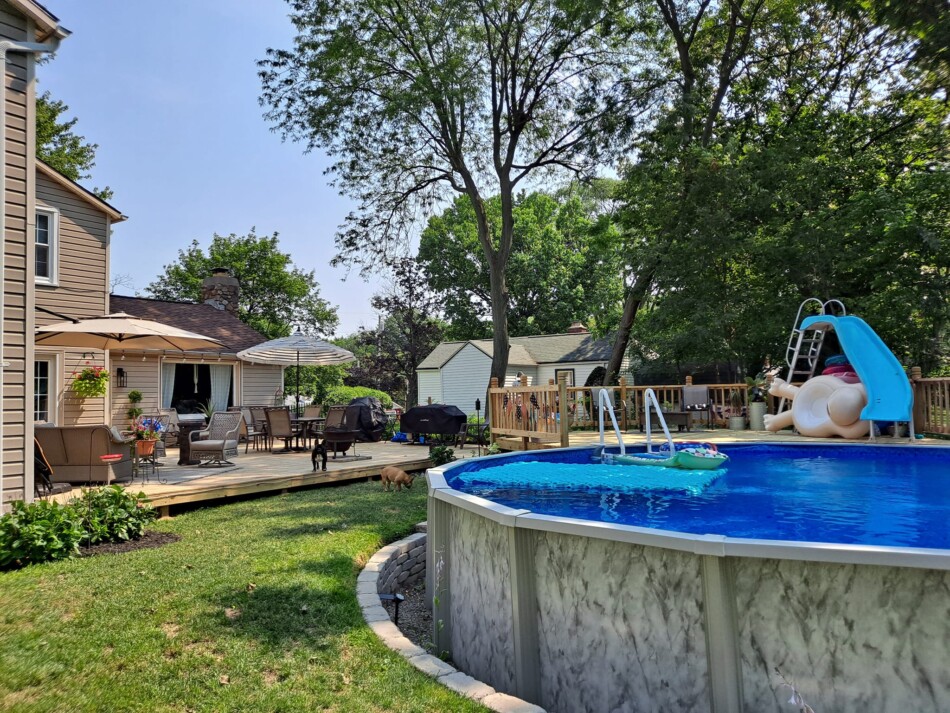One of the reasons for getting an above-ground pool is how easy and quick the entire process should be. Plus the obvious price differences in comparison to an inground pool. But, do above ground pools need a permit? If so, this will add time and increase costs to your above-ground pool project.
Many municipalities and counties across the United States require above-ground pools to have a permit even though they are not permanent structures. If so, you’ll most likely need both a building permit and an electrical permit. This will require submitting the specifications for your pool, the construction plans for decking if you are building that, and perhaps a plot plan to show possible easements and property lines. HOA regulations might also prevent your above-ground pool from going up and you might need to pass the process of your HOA approval before applying for your permits.
I’ll cover some common questions and also the process of getting your permit for your above ground pool in the rest of the article.
Which Type of Above Ground Pool Needs a Permit?
A good rule of thumb for you to use while trying to figure out initially if you are going to need a permit is if your structure will in some way be connected to your home. And in the case of above-ground pools, you will need to run an electrical line to your plumbing equipment which connects this to your home. So, it could be likely you might need to place an application for a permit.
Portable pools like the Intex, Bestway, or Summer Waves are excellent pools for those wanting to avoid the hassle that might be associated with getting permits. If you are able to operate the pool pumps for these portable pools with just an extension cord then you might find that it’s possible to set these up without the necessary permits. Although, it is going to be determined by your municipalities rules or the regulations of your HOA.
What Permits Do You Need for Your Above-Ground Pool?
It’s possible that you will need a building permit for your above-ground pool. The primary focus of this permit is going to be in regard to the fencing and barrier that you use to keep the pool inaccessible to small children. Of course, the permit will also make sure that the pool isn’t being built on any easements or property lines where it shouldn’t be. You can check out our article about above ground pool fencing to learn more about the possible requirements you’ll need to meet for your fence to meet the building permits final inspection.
The other permit you will need is for the electrical line that will need to be run to operate your pool equipment. With a large above-ground pool, the equipment to push that many gallons is pretty heavy duty so an additional electrical line is required to be run. You’ll need to have an electrician install the line and it will need to be inspected.
How do You Get the Permit for an Above Ground Pool?
Getting your permit can be a bit of a process that might take up to 1 or 2 weeks and finish with final approval by an inspector.
- Step 1: Check to see if you have any HOA regulations that apply to pools. Above ground pools are especially villanized in HOA agreements.
- Step 2: Call your local government to find out if you need any permits for an above ground pool and what documents exactly you will need to submit for the application process. The fee might be around $60 and above for each application.
- Step 3: Call a utility survey company to come and mark possible utility easements that run through your property. It would be best not to build on an easement if possible.
- Step 3: After approval, your project can begin.
- Step 4: On the day of completion, let your inspector know that you are ready to have your inspection. The inspector might be available the very next day.
Why do above ground pools need a permit?
My suspicion is that these permits are often required because it’s a way to generate income for your city. Which to be honest, is fair enough. Governments do have to find a way to generate revenue to put into public services, which is a different topic for a different time.
But, in fairness, there are ALOT of stupid people out there that don’t think about others. This means you have people putting up dangerous projects that could cause injury to young children. Especially when you are discussing pools. A majority of the drowning of children happens in residential pools and I believe if the government wants to step in to keep some idiots from putting in a dangerous pool that they have no business owning, then so be it. It will cause a hassle for some of us, but I think it’s probably worth it if it has the possibility of saving a young person’s life.
How much do the permits cost for an above-ground pool?
Permits in general are not very expensive. You are looking at paying upwards of $60 dollars. The wait time, if everything with your submitted application is approved, should be about 1 or 2 weeks. Be sure to clearly indicate everything you will be doing to your property when asking what documentation you’ll need to submit. There is nothing more annoying than the back and forth of red tape.
Do Homeowners Install Above Ground Pools Without a Permit?
Yes, homeowners install above ground pools every day without permits. This happens most often because homeowners don’t even know they need a permit for an above ground pool since it is just a temporary structure. While others aren’t required by their local government to have a permit and of course, some just don’t care. If you don’t have an HOA or nosey neighbors, you could probably get away with putting up your pool without having any issues or facing penalties because of not having your permit. But, as an anecdote I recently read, you could be facing issues if you do ever require a permit for something else and then the government sees your unpermitted pool in your backyard. You might be facing a fine in that instance and need to pay it before they will issue a permit for your current project at the time.

